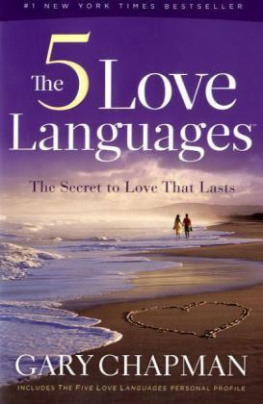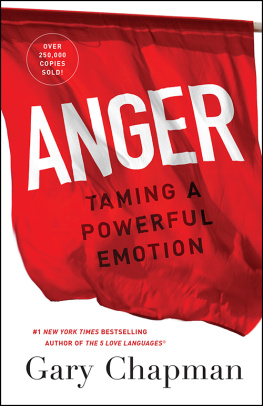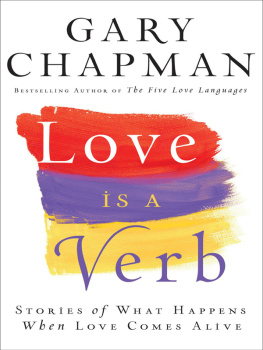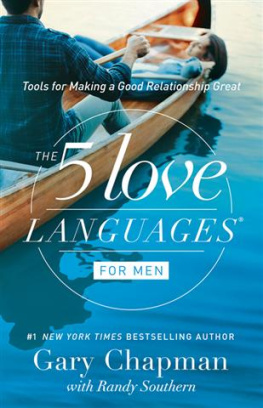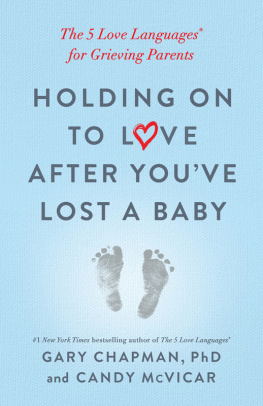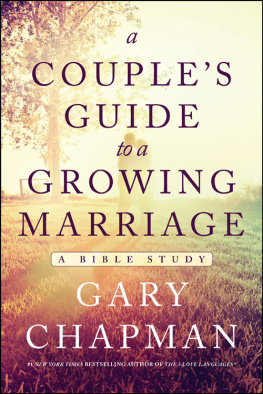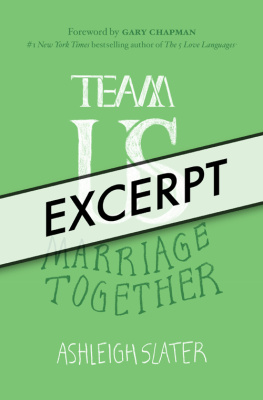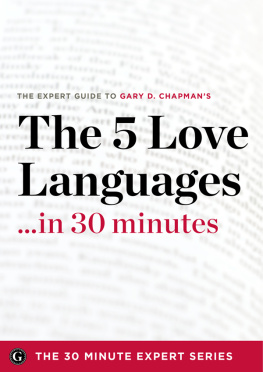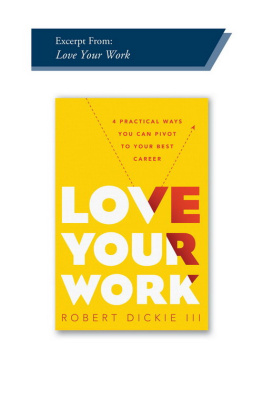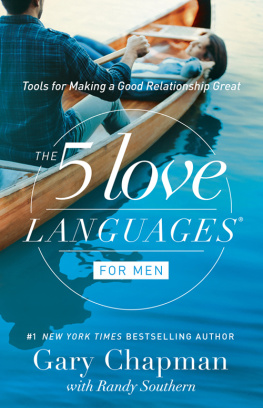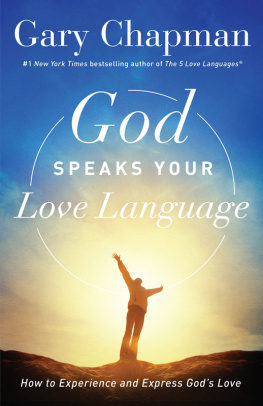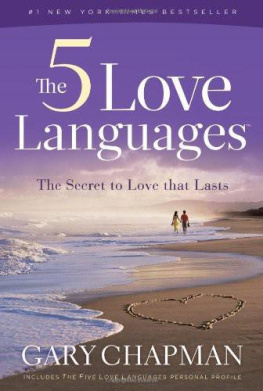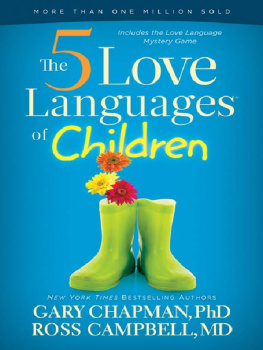T HE Five L OVE L ANGUAGES
T HE Five L OVE L ANGUAGES
How to Express Heartfelt Commitment to Your Mate
G ARY C HAPMAN
N ORTHFIELD P UBLISHING
CHICAGO
1992, 1995, 2004
by Gary D. Chapman
All rights reserved. No part of this book may be reproduced in any form without permission in writing from the publisher, except in the case of brief quotations embodied in critical articles or reviews.
Scripture quotations, unless noted otherwise, are taken from the Holy Bible: New International Version . Copyright 1973, 1978, 1984, International Bible Society. Used by permission of Zondervan Publishing House. All rights reserved.
The use of selected references from various versions of the Bible in this publication does not necessarily imply publisher endorsement of the versions in their entirety.
ISBN: 978-1-881273-15-6
To Karolyn,
Shelley, and Derek
Other Great Books by Gary Chapman
The Five Love Languages Mens Edition
The Five Love Languages Gift Edition
The Five Love Languages of Children
The Five Love Languages of Teenagers
The Five Love Languages for Singles
Your Gift of Love
Parenting Your Adult Child
The Other Side of Love
Loving Solutions
Five Signs of a Loving Family
Toward a Growing Marriage
Hope for the Separated
Covenant Marriage
CONTENTS
ACKNOWLEDGMENTS
Love begins, or should begin, at home. For me that means Sam and Grace, Dad and Mom, who have loved me for more than fifty years. Without them I would still be seeking love instead of writing about it. Home also means Karolyn, to whom I have been married for more than forty years. If all wives loved as she does, fewer men would be looking over the fence. Shelley and Derek are now out of the nest, exploring new worlds, but I feel secure in the warmth of their love. I am blessed and grateful.
I am indebted to a host of professionals who have influenced my concepts of love. Among them are psychiatrists Ross Campbell, Judson Swihart, and Scott Peck. For editorial assistance, I am indebted to Debbie Barr and Cathy Peterson. The technical expertise of Tricia Kube and Don Schmidt made it possible to meet publication deadlines. Last, and most important, I want to express my gratitude to the hundreds of couples who, over the past thirty years, have shared the intimate side of their lives with me. This book is a tribute to their honesty.
chapter one
W HAT H APPENS TO L OVE A FTER THE W EDDING ?
A t 30,000 feet, somewhere between Buffalo and Dallas, he put his magazine in his seat pocket, turned in my direction, and asked, What kind of work do you do?
I do marriage counseling and lead marriage enrichment seminars, I said matter-of-factly.
Ive been wanting to ask someone this for a long time, he said. What happens to the love after you get married?
Relinquishing my hopes of getting a nap, I asked, What do you mean?
Well, he said, Ive been married three times, and each time, it was wonderful before we got married, but somehow after the wedding it all fell apart. All the love I thought I had for her and the love she seemed to have for me evaporated. I am a fairly intelligent person. I operate a successful business, but I dont understand it.
How long were you married? I asked.
The first one lasted about ten years. The second time, we were married three years, and the last one, almost six years.
Did your love evaporate immediately after the wedding, or was it a gradual loss? I inquired.
Well, the second one went wrong from the very beginning. I dont know what happened. I really thought we loved each other, but the honeymoon was a disaster, and we never recovered. We only dated six months. It was a whirlwind romance. It was really exciting! But after the marriage, it was a battle from the beginning.
In my first marriage, we had three or four good years before the baby came. After the baby was born, I felt like she gave her attention to the baby and I no longer mattered. It was as if her one goal in life was to have a baby, and after the baby, she no longer needed me.
Did you tell her that? I asked.
Oh, yes, I told her. She said I was crazy. She said I did not understand the stress of being a twenty-four-hour nurse. She said I should be more understanding and help her more. I really tried, but it didnt seem to make any difference. After that, we just grew further apart. After a while, there was no love left, just deadness. Both of us agreed that the marriage was over.
My last marriage? I really thought that one would be different. I had been divorced for three years. We dated each other for two years. I really thought we knew what we were doing, and I thought that perhaps for the first time I really knew what it meant to love someone. I genuinely felt that she loved me.
After the wedding, I dont think I changed. I continued to express love to her as I had before marriage. I told her how beautiful she was. I told her how much I loved her. I told her how proud I was to be her husband. But a few months after marriage, she started complaining; about petty things at firstlike my not taking the garbage out or not hanging up my clothes. Later, she went to attacking my character, telling me she didnt feel she could trust me, accusing me of not being faithful to her. She became a totally negative person. Before marriage, she was never negative. She was one of the most positive people I have ever met. That is one of the things that attracted me to her. She never complained about anything. Everything I did was wonderful, but once we were married, it seemed I could do nothing right. I honestly dont know what happened. Eventually, I lost my love for her and began to resent her. She obviously had no love for me. We agreed there was no benefit to our living together any longer, so we split.
That was a year ago. So my question is, What happens to love after the wedding? Is my experience common? Is that why we have so many divorces in our country? I cant believe that it happened to me three times. And those who dont divorce, do they learn to live with the emptiness, or does love really stay alive in some marriages? If so, how?
T he questions my friend seated in 5A was asking are the questions that thousands of married and divorced persons are asking today. Some are asking friends, some are asking counselors and clergy, and some are asking themselves. Sometimes the answers are couched in psychological research jargon that is almost incomprehensible. Sometimes they are couched in humor and folklore. Most of the jokes and pithy sayings contain some truth, but they are like offering an aspirin to a person with cancer.
The desire for romantic love in marriage is deeply rooted in our psychological makeup. Almost every popular magazine has at least one article each issue on keeping love alive in a marriage. Books abound on the subject. Television and radio talk shows deal with it. Keeping love alive in our marriages is serious business.
With all the books, magazines, and practical help available, why is it that so few couples seem to have found the secret to keeping love alive after the wedding? Why is it that a couple can attend a communication workshop, hear wonderful ideas on how to enhance communication, return home, and find themselves totally unable to implement the communication patterns demonstrated? How is it that we read a magazine article on 101 Ways to Express Love to Your Spouse, select two or three ways that seem especially good to us, try them, and our spouse doesnt even acknowledge our effort? We give up on the other 98 ways and go back to life as usual.
We must be willing to learn our spouses primary love language if we are to be effective communicators of love.
T he answer to those questions is the purpose of this book. It is not that the books and articles already published are not helpful. The problem is that we have overlooked one fundamental truth: People speak different love languages.
Next page
